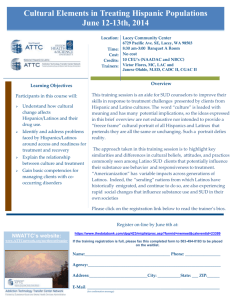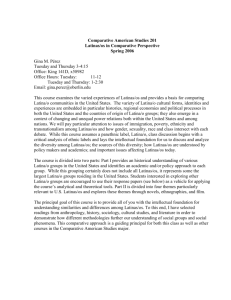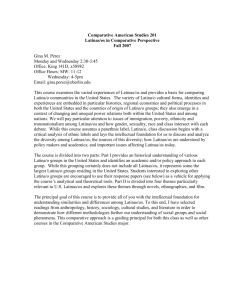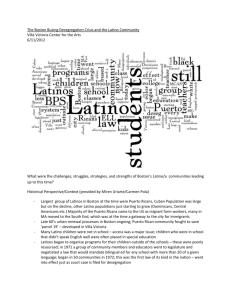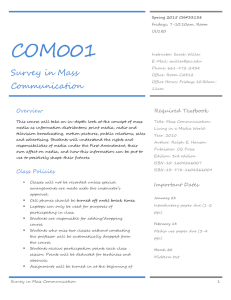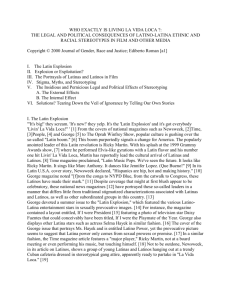Challenging Fronteras: Structuring Latina and Latino
advertisement
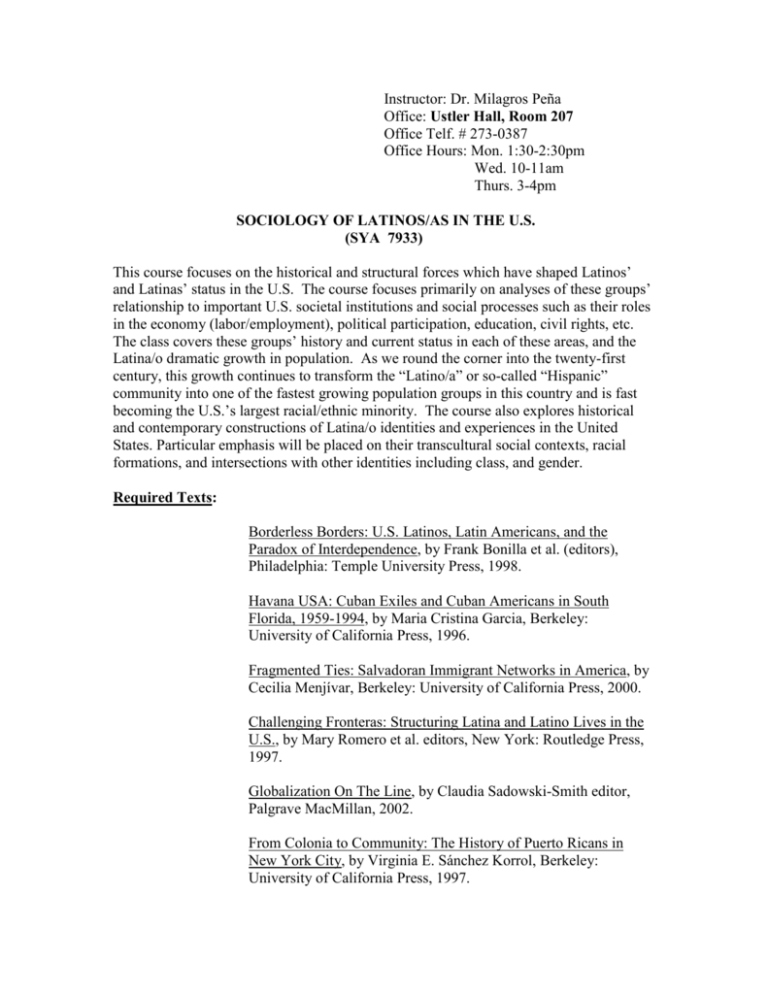
Instructor: Dr. Milagros Peña Office: Ustler Hall, Room 207 Office Telf. # 273-0387 Office Hours: Mon. 1:30-2:30pm Wed. 10-11am Thurs. 3-4pm SOCIOLOGY OF LATINOS/AS IN THE U.S. (SYA 7933) This course focuses on the historical and structural forces which have shaped Latinos’ and Latinas’ status in the U.S. The course focuses primarily on analyses of these groups’ relationship to important U.S. societal institutions and social processes such as their roles in the economy (labor/employment), political participation, education, civil rights, etc. The class covers these groups’ history and current status in each of these areas, and the Latina/o dramatic growth in population. As we round the corner into the twenty-first century, this growth continues to transform the “Latino/a” or so-called “Hispanic” community into one of the fastest growing population groups in this country and is fast becoming the U.S.’s largest racial/ethnic minority. The course also explores historical and contemporary constructions of Latina/o identities and experiences in the United States. Particular emphasis will be placed on their transcultural social contexts, racial formations, and intersections with other identities including class, and gender. Required Texts: Borderless Borders: U.S. Latinos, Latin Americans, and the Paradox of Interdependence, by Frank Bonilla et al. (editors), Philadelphia: Temple University Press, 1998. Havana USA: Cuban Exiles and Cuban Americans in South Florida, 1959-1994, by Maria Cristina Garcia, Berkeley: University of California Press, 1996. Fragmented Ties: Salvadoran Immigrant Networks in America, by Cecilia Menjívar, Berkeley: University of California Press, 2000. Challenging Fronteras: Structuring Latina and Latino Lives in the U.S., by Mary Romero et al. editors, New York: Routledge Press, 1997. Globalization On The Line, by Claudia Sadowski-Smith editor, Palgrave MacMillan, 2002. From Colonia to Community: The History of Puerto Ricans in New York City, by Virginia E. Sánchez Korrol, Berkeley: University of California Press, 1997. 2 Course Requirements: 1 research paper (17-20 pages in length) 40% Midterm 30% Participation in 3 Questions/Responses Sessions 30% **** There are no make-ups on any of the exams, except for Medical or other problems that may emerge and for which you will provide written documentation as proof of unforeseen emergency. There will be no exceptions for undocumented emergencies. **** All assignments that are completed late will not receive full credit (for example, for each day a paper is late there will be a full point deduction). **** On written and class assignments: Class assignments (participation in Questions/Responses Sessions) must be done on assigned date. Failure to be prepared or a “no show” on the date of your class assignment will receive a zero for that assignment. There will be no reassignment of class assignments except for medical or unforeseen emergency that is documented. ****Students requesting classroom accommodation: must first register with the Dean of Students Office. The Dean of Students Office will provide documentation to the student who must then provide this documentation to the Instructor when requesting accommodation. Course Outline Week 1 (August 28) Framing the Latina/o Experience Course outline, requirements and framing conquest and immigration in studying the Latina/o experience. Borderless Borders Chapter 10; Globalization On The Line Introduction and pgs. 53-68. Other Suggested Readings: Bean, Frank M. and Marta Tienda. 1987. The Hispanic Population of the United States. New York: Russell Sage Foundation. 3 ***We are off on September 4th (Labor Day) Week 2 (September 11) Foundation and History of the Mexican American Experience: Borderless Borders Chapter 8; Challenging Fronteras Chapters 1 and 6; Globalization On The Line pgs 69-97. Other suggested readings: Acuña, Rodolfo. Occupied America: A History of Chicanos, New York: Harper and Row, 1988. Deutsch, Sarah. 1987. No Separate Refuge: Culture, Class, and Gender on an AngloHispanic Frontier in the American Southwest, 1880-1940. New York: Oxford University Press. Meier Matt S. and Feliciano Ribera. Mexican Americans/American Mexicans: From Conquistadors to Chicanos, Hill and Wang, 1993. Mirande, Alfredo. The Chicano Experience: An Alternative Perspective. Notre Dame: University of Notre Dame Press, 1985. Week 3 (September 18) Foundation and History of the Caribbean American Experience: From Colonia to Community Preface, Chapters 2; Havana USA Introduction, Chapter 1 and 2; Challenging Fronteras Chapter 8; Borderless Borders Chapter 9. Other suggested Readings: Grasmuck, Sherri and Patricia R. Pessar. Between Two Islands: Dominican International Migration California: University of California Press, 1991. Pedraza-Bailey, S. Political and Economic Migrants in America: Cubans and Mexicans. Berkeley: University of California Press, 1985. Portes, Alejandro, and Robert L. Bach. Latin Journey: A Longitudinal Study of Cuban and Mexican Immigrants in the United States. Berkeley: U. of Cal. Press, 1984. Portes, A. and R. Rumbaut. Immigrant America: A Portrait. Berkeley: University of California Press, 1990. Rodriguez, Clara. 1989. Puerto Ricans: Born in the USA. Boston: Unwin Hyman, Inc. 4 Week 4 (September 25) Foundation and History of the Central and South American Experience: Fragmented Ties Chapters 2,3, and 4; Challenging Fronteras Chapter 4 and 7. Week 5 (October 2) Constructing the Latina/o Identity: "Hispanic," "Latino," "American": Havana USA Chapter 3; Challenging Fronteras Chapters 2, 3 and 9; Other suggested readings: Anisman, Paul H. "Some Aspects of Code Switching in New York Puerto Rican English." Bilingual Review. 2 (1975): 56-85. Espín, Oliva M. 1995. “Cultural and Historical Influences on Sexuality in Hipanic/Latin Women: Implications for Psychotherapy.” Pp. 141-146 in Race, Class, and Gender, edited by Margaret L. Andersen and Patricia Hill Collins California: Wadsworth Publishing Company. Sánchez, George J. Becoming Mexican American: Ethnicity, Culture and Identity in Chicano Los Angeles, 1900-1945, New York: Oxford University Press, 1993. Week 6 (October 9) Building Social Capital: Latinos and Latinas on the Move: Havana USA Chapter 4; Fragmented Ties Chapters 1, 5, 7, and 8; Other suggested readings: Pérez-Stable, Marifeli and Uriarte. “Cubans and the Changing Economy of Miami. In R. Morales and Frank Bonilla (Eds.), Latinos in a Changing U.S. Economy: Comparative Perspectives on Growing Inequality. Newbury Park, CA: Sage, 1993. Pessar, P.R. “The Elusive Enclave: Ethnicity, Class, and Nationality Among Latino Entrepreneurs in Greater Washington, D.C. Human Organizations (1995) 54, pgs. 383392. Portes, Alejandro. “The Social Origins of the Cuban Enclave Economy of Miami,” Sociological Perspectives, (1987) 30, pgs. 340-372. 5 Zsembik, Barbara A. “The Cuban Ethnic Economy and Labor Market Outcomes of Latinos in Metropolitan Florida,” Hispanic Journal of Behavioral Sciences, Vol. 22 No. 2, May 2000, pgs. 222-235. Week 7 (October 16) Latinas/os and Urban Politics: From Colonia to Community Chapter 3, 4, 5 and 6; Challenging Fronteras Chapter 17. Other suggested readings: Flores, Juan; John Attinasi, and Pedro Pedraza Jr. "La Carreta Made a U-turn: Puerto Rican Language and Culture in the United States." DAEDALUS 110.2 (1981): 193-217. Moore, Joan and Raquel Pinderhughes. In the Barrios: Latinos and the Underclass Debate, New York: Russell Sage Foundation, 1993. Week 8 (October 23) ****** Midterm First Half of Class ******* “El Barrio” and Barrio Consciousness: Borderless Borders Chapter 7; Globalization on the Line pgs. 147-165; and pgs 201-240. Other suggested Readings: Moore, Joan W. 1991. Going Down to the Barrio: Homeboys and Homegirls in Change. Philadelphia: Temple University Press. Padilla, Felix M. Latino Ethnic Consciousness: The Case of Mexican Americans and Puerto Ricans in Chicago. Notre Dame: University of Notre Dame Press, 1985. Week 9 (October 30) Constructing Latino/a Identity and the Complexities of the Race Question: Challenging Fronteras Chapters 10 and 11; Borderless Borders Chapter 6. Other Suggested Readings: Barrera, Mario. 1979. Race and Class in the Southwest: A Theory of Racial Inequality. Notre Dame: University of Notre Dame Press. Omi, Michael and Howard Winant. 1986. Racial Formation in the United States. New York and London: Routledge and Kegan Paul. 6 Pérez y Mena, Andrés. “Cuban Santería, Haitian Vodun, Puerto Rican Spiritualism: A Multicultural Inquiry Into Syncretism,” 1997. Journal for the Scientific Study of Religion. Vol. 37. No.1. Pérez y Mena, Andrés. Speaking With The Dead: Development of Afro-Latin Religion Among Puerto Ricans in the United States. 1991. New York City: AMS Press. Week 10 (November 6) Bringing it Home: Politics and Social Movements: Havana USA Chapter 5; Borderless Borders Chapters 12, 13, and 14. Other suggested Readings: de la Garza, Rodolfo O. Louis DeSipio, F. Chris Garcia, John Garcia, and Angelo Falcon. 1992. Latino Voices: Mexican, Puerto Rican, and Cuban Perspectives on American Politics. Boulder: Westview Press. García, F. Chris (editor). Latinos and the Political System, Indiana:University of Notre Dame Press, 1988. Segura, Denise. 1984. “Labor Market Stratification: The Chicana Experience,” Berkeley Journal of Sociology 29 (Spring): 57-91. Zavela, Patricia. 1987. Women’s Work and Chicano Families. Cornell University Press. Week 11 (November 13) Latinas on the Move: Latinas and the Women’s Movement: Fragmented Ties Chapter 6; Challenging Fronteras Chapters 12 and 14; Globalization on the Line pgs 183-200. Other suggested readings: Cordova, Teresa. 1993. Chicana Voices: Intersections of Class, Race, and Gender. Albuquerque: University of New Mexico Press. Fernandez-Kelly, M.P. and A. Garcia. "Invisible Amidst the Glitter: Hispanic Women in the Southern California Electronics Industry" in A. Statham, M. Miller, and H. Maukush (eds.) The Worth of Women's Work: A Quantitative Synthesis. Alabany: SUNY Press, 1988. Garcia, Alma M., Ed. 1997. Chicana Feminist Thought. New York: Routledge. 7 Gurak, Douglas T. and Mary M. Kritz. "Dominican and Colombian Women in New York: household Structure and Employment Patterns." Migration Today 10.3-4 (1982): 14-21. Hardy-Fanta, Carol. 1993. Latina Politics, Latino Politics: Gender, Culture, and Political Participation in Boston. Philadelphia: Temple University Press. Hondagneu-Sotelo, Pierrette. 1993. “New Perspectives on Latina Women.” Feminist Studies. 19:193-201. Mirande, Alfredo and Evangelina Enriquez. La Chicana: The Mexican American Woman. Chicago: The University of Chicago Press, 1979. Week 12 (November 20) *** PAPERS DUE WEDNESDAY NOVEMBER 20 *** Latinas and Latinos Beyond Borders: Borderless Borders Chapters 1, 2, 3, and 4. Other Suggested Readings: Fernández-Kelly, María Patricia. 1983. For We Are Sold, I And My People: Women and Industry in Mexico’s Frontier. New York: State University of New York Press. Ruiz, Vicki L. and Susan Tiano. 1987. Women on the U. S.-Mexico Border: Responses to Change. Boston: Allen & Unwin. Week 13 (November 27) Toward Latina/o Global Identities: Borderless Borders Chapters 5 and 11. The Future of the Latina/o Presence in U.S. Society: From Colonia to Community Chapter 7; Havana USA Conclusion; Challenging Fronteras Chapter 16; Globalization on the Line pgs 31-52; and 99-118. Other Suggested Readings: Villlarreal, Roberto E., Norma Hernandez and Howard D. Neighbor, Eds. 1988. Latino Empowerment: Progress, Problems, and Prospects. New York: Greenwood Press. Week 14 (December 4) ***LAST Day of Class, Paper Presentations by Topic*** CLASSES END DECEMBER 6th.
